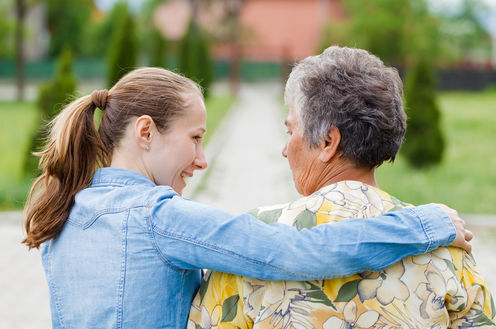
In Australia, the question of how to provide care for ageing family members is largely an individual one. Most care is provided by family members. In 2012, 2.7 million Australians were providing some type of informal (unpaid) family caregiving. Some are “sandwiched”, caring for children and older adults simultaneously. Yet caregiving is not shouldered equally by the entire population: women and minorities are much more likely to provide care.
Those with disabilities themselves are also more likely to be primary dependent carers in Australia. These families are shouldering a high level of carework.
Finally, moving family members into the home is often motivated by the poor quality of paid care. This suggests that there are limited options in the market. These trends are mirrored in many countries – adult children in Europe are increasingly providing care as a substitute for formal care, and informal care is normative in the United States as well.
All told, we have a “care-adox” in the Australia. People are living longer, yet the systems to provide care for older adults are informal and inadequate.
Because family caregiving is embedded within broader family experiences, the answers to the social, political and ethical questions that caregiving raises are not simple. Caregiving can be a rewarding experience, providing a sense of meaning and fulfilment, and improve the relationship with the care recipient. In multigenerational households, the older adult may help ease childcare burdens.
Importantly, caregiving can be stressful and damaging to well-being. For example, it impairs immune function and accelerates immune system ageing. Caregiver experiences vary widely, but caregivers who experience chronic burden or stress tend to have the most severe health consequences.
The ‘coercive caregiving’ phenomenon
Research suggests that when people are expected to do something but do not have the resources to fulfil expectations, they experience health-harming role strain. Caregiving therefore should be most harmful to health when individuals are expected to provide care but lack the resources to do so effectively.
In Australia, caregiving has historically fallen to women and ethnic minorities due to their social statuses. Individuals are thus “coerced” into caregiving through social norms and lack of institutional support. In these contexts, when alternate options are unavailable, women may step into caregiving roles despite lacking the support needed to fulfil those expectations.
The gender bias in these experiences is clear. Caregiving daughters report greater depression, but this is not the case for caregiving sons. These studies suggest that coerced care can be damaging to caregivers’ well-being, particularly for female caregivers.
We addressed these issues in our recent research. We asked whether caregivers in countries with greater societal “pressure” for informal family caregiving – in the form of strong social norms for familial care or limited public transfers for old-age programs – have lower well-being than caregivers in countries with weaker familial care norms and more old-age public transfers.
We found substantial country variation in familial care norms – that is, people’s attitudes about whether care for ageing parents should be provided by adult children in-home. Support for familial care norms ranged from 4% in Sweden and the Netherlands to 59% in Poland and 74% in Turkey.
Do country differences in familial care norms impact individual well-being? We expected that caregivers would report worse well-being in countries where caregiving was expected to be done in the home. We found, however, that only female caregivers suffer from stronger familial care norms.
The extent of public transfers is also associated with female caregiver well-being. Female caregivers have worse well-being in countries with stronger norms for in-home familial care, and fewer public transfers to support ageing care.
These findings suggest that women in countries where market or government subsidies for old-age care are not readily available may be more severely disadvantaged by caregiving responsibilities. This is consistent with previous research finding that female caregivers are more likely to be stressed, depressed, drop out of the labour force, and be sandwiched.
The way forward
That caregivers in ostensibly coercive contexts report worse well-being may reflect role strain, including a lack of financial, social, emotional or other resources.
Consider what it takes to provide care, particularly long-term, for an older adult. In Australia, long-term care requires a complete reorganisation of a person’s family and employment patterns. With approximately 12% of the Australian population (and counting) providing care, the current system is unsustainable. As the burden of care and number of caregivers increase, so too will societal economic and health impacts.
Middle-age adults who are beginning to experience their own health issues face compounding health effects of caregiving, leading to health problems earlier in life. This will certainly impact the health care system as the number of caregivers grows.
But this bleak story can become one of hope. Two potential starting points include:
-
Broad policies to support caregivers through paid home care, community-care services, and more equitable sharing of care work in society; and
-
Facilitation of a larger discussion about the difficulties of caregiving so that we have more realistic expectations.
Comprehensive policy changes would provide caregivers with more consistent support. Family policy and caregiving policy are intertwined, so extending family leave policies and adopting broader definitions of “family” will also address the needs of caregivers for all types of dependents.
Caregivers provide a valuable service to their loved ones and to society. Providing support for them is a pressing social problem that demands broad policy action to break the chains of coerced care. There is no better time to begin planning for this immediate future.
An earlier version of this article was published on The Society Pages.
The authors do not work for, consult to, own shares in or receive funding from any company or organisation that would benefit from this article. They also have no relevant affiliations.
